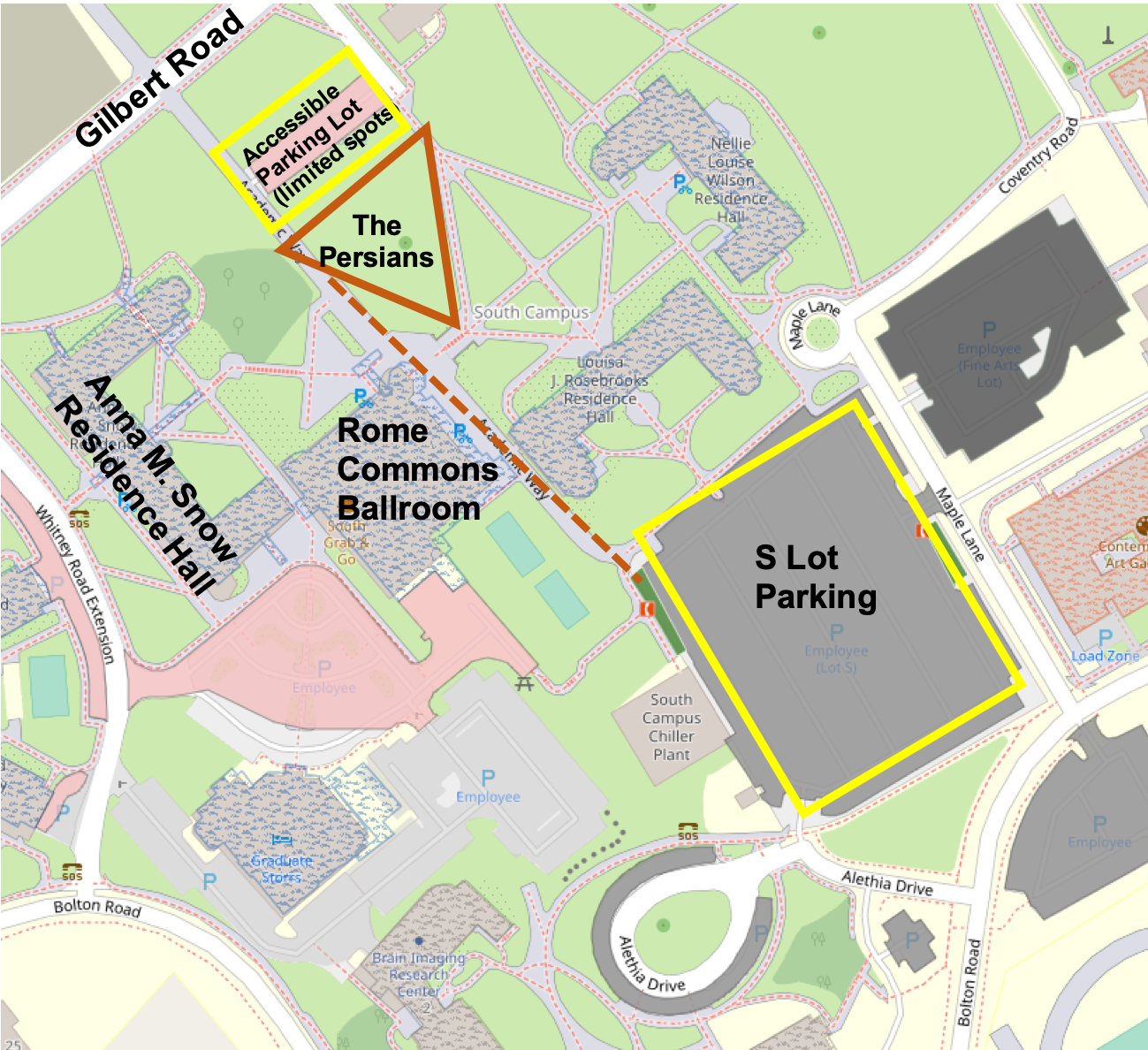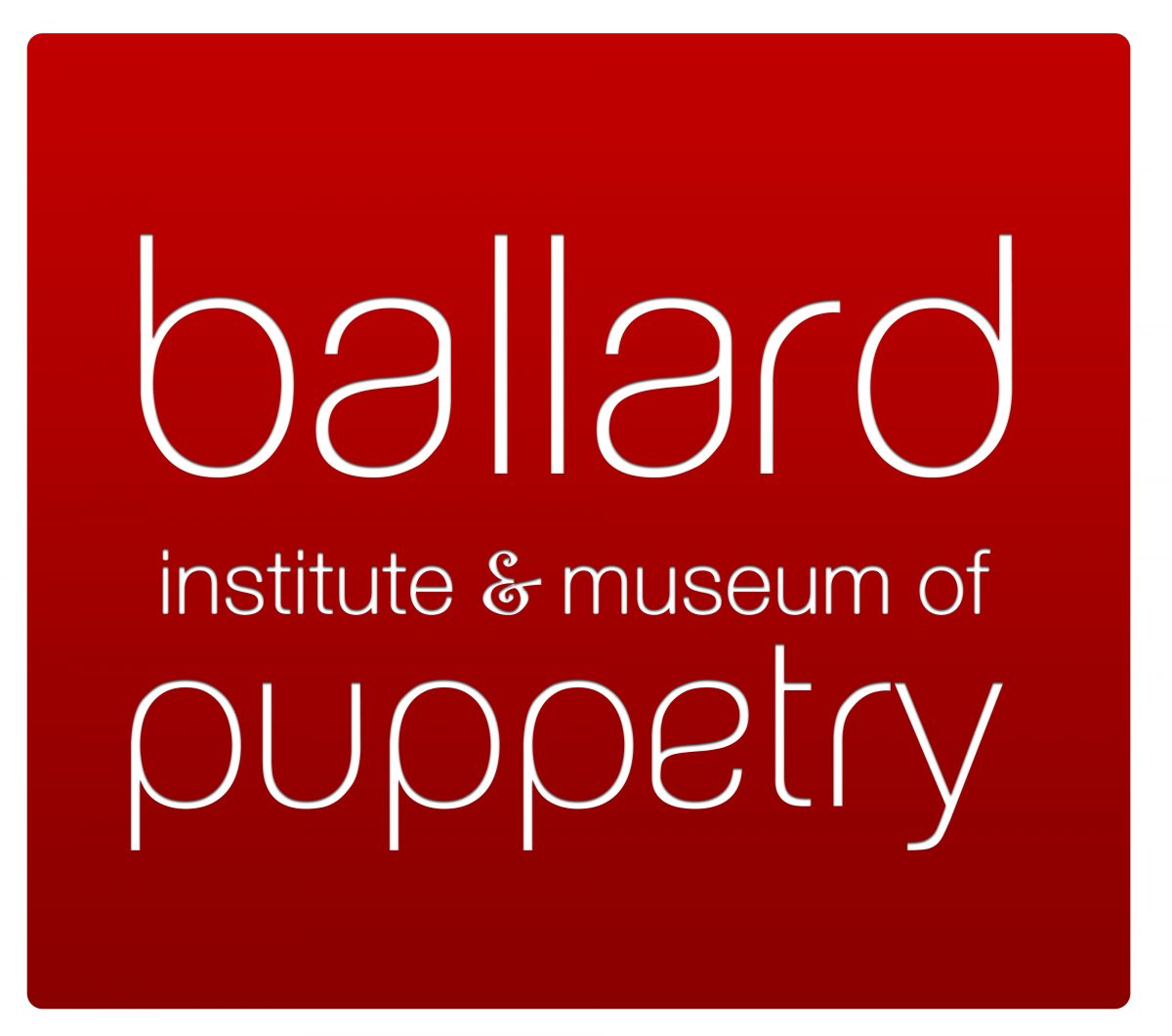 Due to maintenance issues, the Ballard Institute will be closed on Wednesday, 5/25. We apologize for the inconvenience!
Due to maintenance issues, the Ballard Institute will be closed on Wednesday, 5/25. We apologize for the inconvenience!
Events
“Tito Matos and Puerto Rican Culture” Online Forum on 5/12 at 7PM
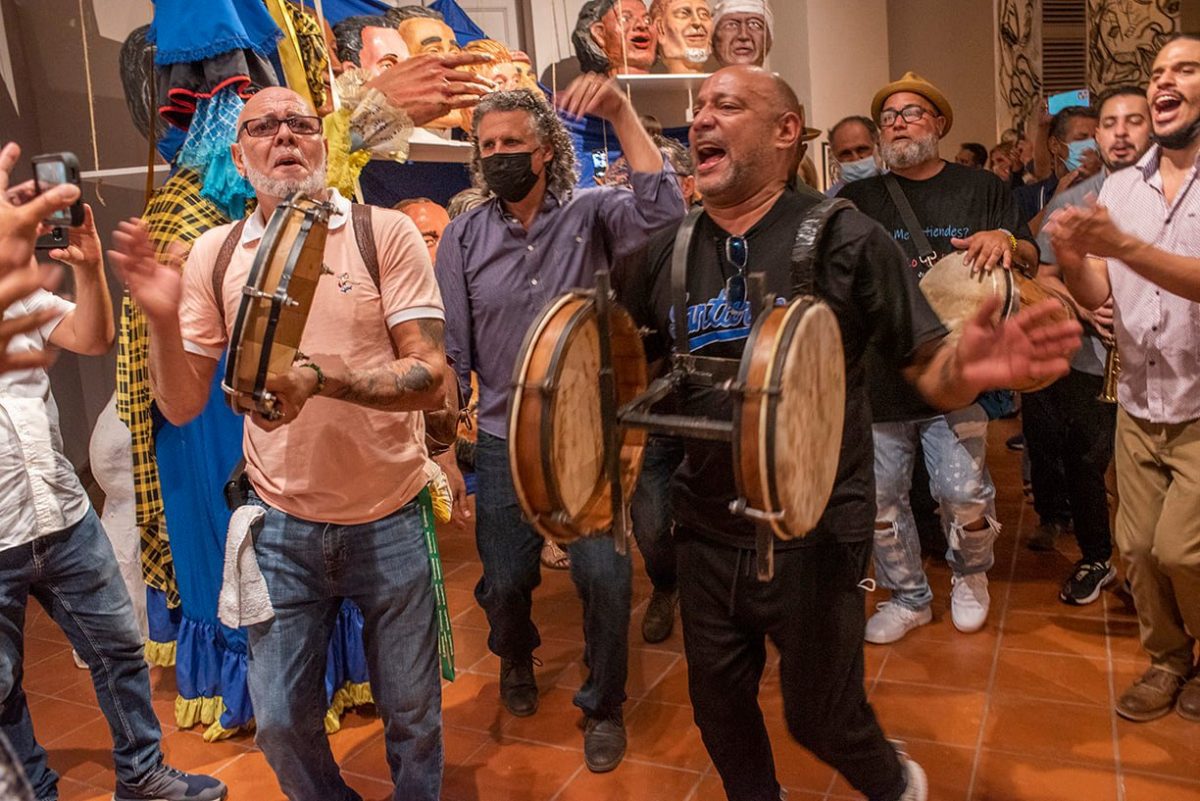
The Ballard Institute and Museum of Puppetry at the University of Connecticut will host “Tito Matos and Puerto Rican Culture” with panelists Pedro Adorno, Emmanuel Santana, Mareia Quintero, Luis Beltran on Thursday, May 12 at 7 p.m. ET. This forum will take place on Zoom (registration required) and Facebook Live and will be available afterwards on the Ballard Institute’s Facebook page and YouTube Channel.
The late Tito Matos, who passed away in January, reinvented the Afro-Puerto Rican singing tradition of plena, and was celebrated in San Juan by a procession that featured music, stilt-dancing, and giant cabesudo portrait masks. This forum will feature Pedro Adorno of the puppet company Agua, Sol y Sereno; Mareia Quintero, a professor cultural studies at the University of Puerto Rico; Emmanuel Santana, a pupil and friend of Tito Matos; and Luis Beltran-Alvarez, a University of Connecticut PhD. student in Political Science. This event is co-sponsored by the El Instituto: Institute of Latina/o, Caribbean, and Latin American Studies.
Mareia Quintero Rivera is Associate Professor at the Masters in Cultural Agency and Administration, and the Interdisciplinary Studies Program, at University of Puerto Rico, Río Piedras Campus. She obtained her Ph.D. in Social History from the University of São Paulo, Brazil. Her major areas of research include cultural criticism in the Hispanic Caribbean and Brazil; cultural policies, and contemporary arts in Puerto Rico. She is the author of the book A cor e o som da nação: A idéia de mestiçagem na crítica musical do Caribe Hispânico Insular e o Brasil (The color and sound of the nation: The idea of miscegenation in the musical criticism of the Insular Hispanic Caribbean and Brazil) and co-editor of the volume Antología del pensamiento crítico puertorriqueño contemporáneo (Anthology of contemporary Puerto Rican critical thought). She has served as president of the Puerto Rican Commission for Cultural Development, and as a member of the Board of Directors of the Institute of Puerto Rican Culture and the School of Visual Arts and Design. She has been a close collaborator of Agua, Sol y Sereno and is currently working on a book about the group.
Pedro Adorno is co-founder and artistic director of Agua, Sol y Sereno. He is a theater and film director and works as an actor, visual artist, educator and stilt man. Agua, Sol y Sereno, founded by Pedro Adorno and Cathy Vigo in 1993, is a non-profit organization that promotes the development of Puerto Rican experimental theater and the democratization of art to all sectors of the population. It links artistic work to social reality through pieces that explore a broad aesthetic range, parades with stilters and big heads puppets, creative workshops, and community residences.
Luis J. Beltrán-Álvarez is from Aguadilla, Puerto Rico. He earned his bachelor’s degrees in Political Science and Sociology from the University of Puerto Rico, Río Piedras Campus, and earned a Master’s degree in Philosophy from the same institution. Currently he is a Ph.D. Candidate in Political Science in Political Theory and Comparative Politics at the University of Connecticut. His main research interests are Political Subjectivities, Social Movements, Decolonial Feminism, Anticolonialism and Decoloniality, Anarchism, Populism, Philosophy of Race/Racism, and Discourse Theory.
Emanuel Santana is a plenero and artist born and raised in Santurce, Puerto Rico. A friend and pupil of Tito Matos, he is also part of the organizing collective Plenazos Callejeros. He also participates and works together in La Goyco community workshop, an organization dedicated to the empowerment, solidarity, and democracy of the community of Santurce. La Goyco’s primary focus is education, culture, and health programs via the empowerment of the community.
Bread and Puppet Theater’s “The Persians” on 4/23 and 4/24
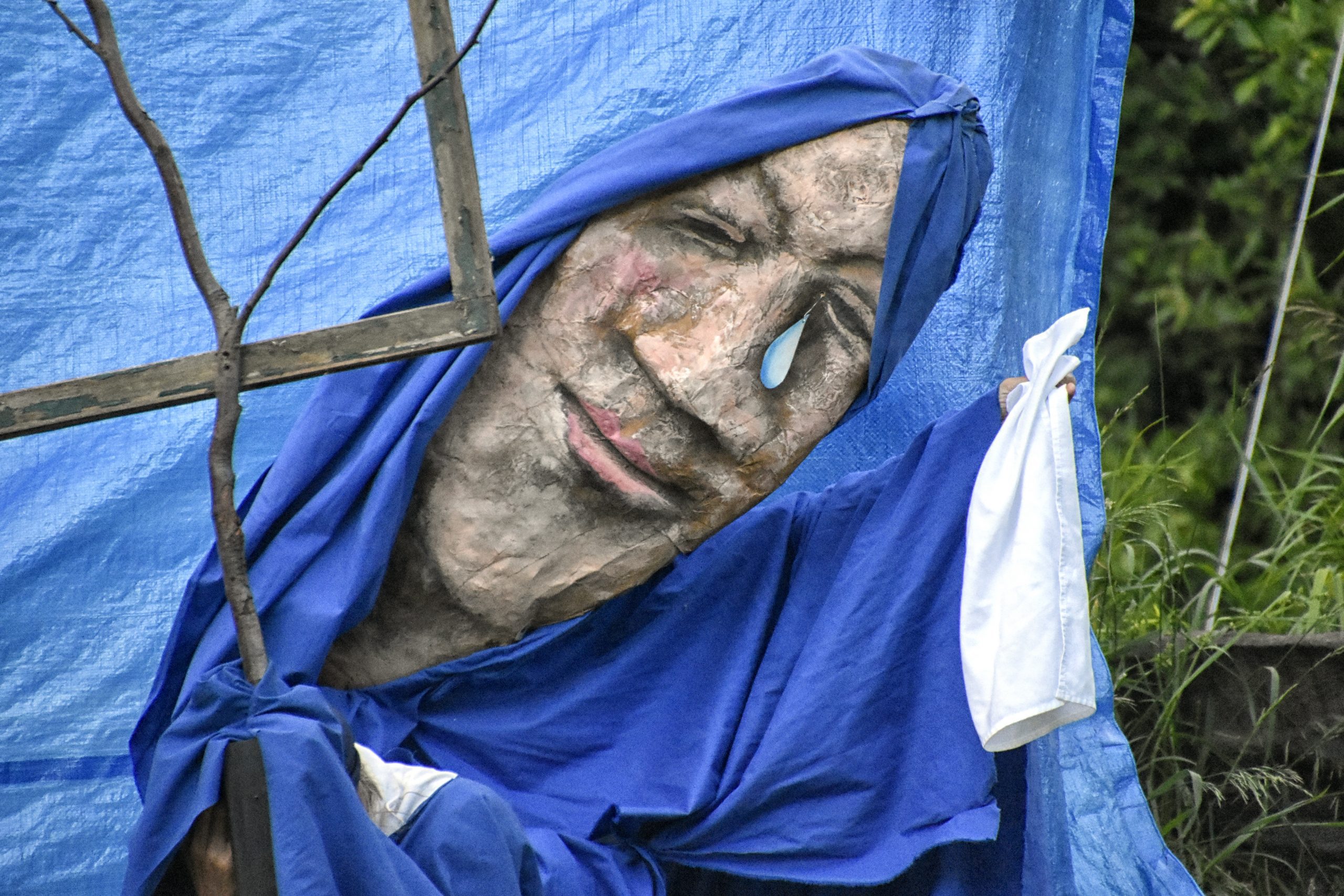
Vermont’s internationally acclaimed Bread and Puppet Theater will return to the University of Connecticut for two outdoor afternoon performances of Aeschylus’ tragedy The Persians on April 23 and 24, 2022.
The show, performed by the Bread and Puppet company together with over 20 community volunteers, will bring together musicians, composers, builders and puppeteers from many eras of Bread and Puppet’s history, and includes giant puppets, flying plastic, Lubberland gesturing, a chorus of screamers, and Johann Sebastian Bach. Bread and Puppet Theater founder and director Peter Schumann explained his interpretation of the 472 BCE tragedy in this manner: “When Athens commissioned Aeschylus to write the official celebration piece for the Greeks’ miraculous victory over the vastly superior Persian Empire invasion force they must have expected just that: a glorification of national prowess & skill. What they got instead is the opposite: heartrending compassion for the slain enemy, lamentation for the despairing mothers and widows of the slain warriors. Can our own permanently warring military industrial empire learn from this?”
Tickets for Bread and Puppet Theater’s The Persians are $15 for adults, and $10 for students and can be purchased online at https://bimp.ticketleap.com/the-persians/. Performances will take place outdoors on UConn’s South Campus Lawn, except in case of inclement weather, in which case performances will take place indoors at a location to be announced. Masks are recommended, but not required, for audience members at either outdoor or indoor performances. Seating will be first come, first served. For outdoor shows, please bring chairs and blankets.
In conjunction with performances of The Persians, join us for two other activities with Bread and Puppet Theater!
Street Shows, Wednesday, April 20 at 12 noon: Bread and Puppet Theater will perform pop-up street shows performed on Fairfield Way will reflect Bread and Puppet’s re-invention of the traditional picture-performance form known as cantastoria, in which a series of colorful paintings are sung and narrated by a chorus of performers and brass musicians. This colorful, celebratory, and thought-provoking performance is suitable for all ages and free.
Puppet Forum, Thursday, April 21 at 12 noon: Bread and Puppet Theater founder and director Peter Schumann and musicians and puppeteers from the Bread and Puppet company will discuss the process of creating a new production of a 472 BCE tragedy lamenting war, defeat, and destruction, with colorful oversize puppets, music by Johann Sebastian Bach, dance, and giant paintings. How can music, sculpture, dance, and painting combine to re-envision one of the oldest Greek tragedies for the 21st century? This event is co-sponsored by the Environmental Theatre Committee of the UConn Department of Dramatic Arts.
This forum will take place in the UConn Dramatic Arts Department’s Mobius Theatre, and will be livestreamed on Zoom (registration required) and Facebook Live, and will be available afterwards on the Ballard Institute’s Facebook page and YouTube Channel.
Funded in part by the New England States Touring program of the New England Foundation for the Arts, made possible with funding from the National Endowment for the Arts Regional Touring Program and the six New England state arts agencies.
The Persians Performance Information
Run time: 80 minutes
Age recommendations: For all ages
Location Information: South Campus Lawn is near the Rome Commons Ballroom and Anna M. Snow Residence Hall, 626 Gilbert Rd, Storrs, CT 06269.
Seating Information: Open seating outdoors; bring your own chairs and blankets. Seating is first come, first served and will begin at 3:30 p.m.
Parking Information: Attendees should park in the S Lot on UConn’s campus, which is a short walk to the South Campus Lawn.
For those with disabilities, a limited number of parking spots will be available in a small lot off of Gilbert Road right next to the performance space.
Covid Guidelines: see https://covid.uconn.edu/campus-guidelines/.
Vaccination Policy: All patrons must comply with the COVID-19 Patron Vaccination Attestation at the point of purchase, located on the Ballard Institute Ticketleap page; however patrons will no longer be required to present physical proof of vaccination or negative COVID-19 test upon entry to the building.
Masking: Masks are recommended but not required.
Bathrooms: Portable toilets will be available for audience members.
Press Kit: https://tinyurl.com/yc84np75
“Bread and Puppet’s The Persians: Making and Performing a Puppet Tragedy” Forum on 4/21
 For its fourth installment of the 2022 Spring Puppet Forum Series, the Ballard Institute and Museum of Puppetry will host “Bread and Puppet’s The Persians: Making and Performing a Puppet Tragedy,” with director Peter Schumann and members of the Bread and Puppet company, on Thursday, April 21 at 12 noon ET. This forum will take place in person in the UConn Dramatic Arts Department’s Mobius Theatre, and will be livestreamed on Zoom (registration required) and Facebook Live, and will be available afterwards on the Ballard Institute’s Facebook page and YouTube Channel.
For its fourth installment of the 2022 Spring Puppet Forum Series, the Ballard Institute and Museum of Puppetry will host “Bread and Puppet’s The Persians: Making and Performing a Puppet Tragedy,” with director Peter Schumann and members of the Bread and Puppet company, on Thursday, April 21 at 12 noon ET. This forum will take place in person in the UConn Dramatic Arts Department’s Mobius Theatre, and will be livestreamed on Zoom (registration required) and Facebook Live, and will be available afterwards on the Ballard Institute’s Facebook page and YouTube Channel.
In conjunction with their outdoor performances of Aeschylus’s tragedy The Persians outdoors on UConn’s South Campus Lawn Saturday and Sunday, April 23-24, Bread and Puppet Theater founder and director Peter Schumann and musicians and puppeteers from the Bread and Puppet company will discuss the process of creating a new production of a 472 BCE tragedy lamenting war, defeat, and destruction, with colorful oversize puppets, music by Johann Sebastian Bach, dance, and giant paintings. How can music, sculpture, dance, and painting combine to re-envision one of the oldest Greek tragedies for the 21st century? This event is co-sponsored by the Environmental Theatre Committee of the UConn Department of Dramatic Arts.
For tickets to the April 23-24 performances of The Persians, visit https://bimp.ticketleap.com/the-persians/. This event is funded in part by the New England States Touring program of the New England Foundation for the Arts, made possible with funding from the National Endowment for the Arts Regional Touring Program and the six New England state arts agencies.
POSTPONED! “Tito Matos and Puerto Rican Culture” Online Forum
Due to the power outage in Puerto Rico, “Tito Matos and Puerto Rican Culture” Online Forum has been rescheduled for May 12 at 7 PM ET on Facebook Live and Zoom.
2022 UConn Spring Puppet Slam: Online! on 3/25 at 8 PM ET
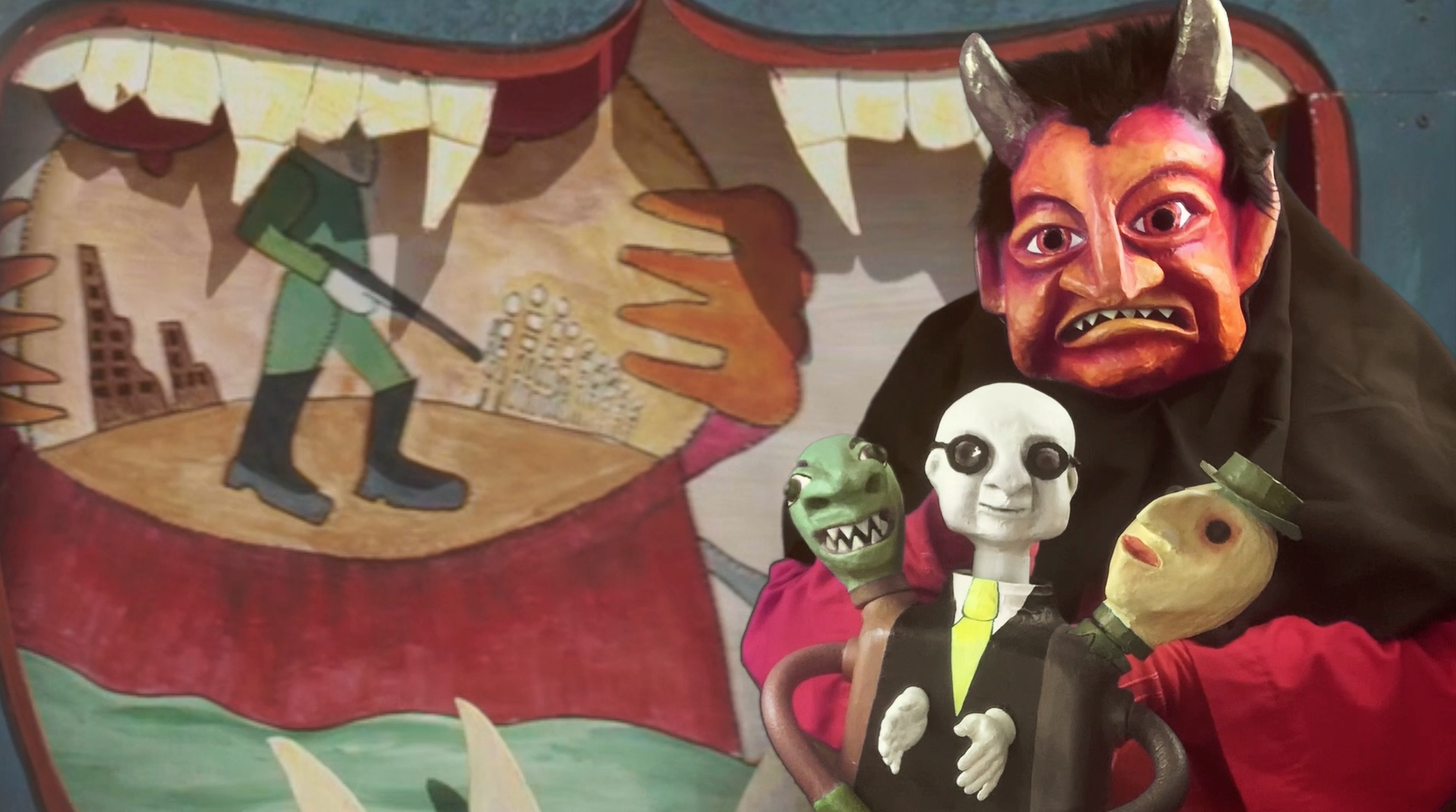
The Ballard Institute and Museum of Puppetry and the UConn Puppet Arts Program will stream an online version of its popular UConn Spring Spring Slam on March 25, 2022 at 8 p.m. ET on Ballard Institute and Museum of Puppetry Facebook Live. The 2022 UConn Spring Puppet Slam: Online!, hosted by Puerto Rico’s favorite YouTube church lady, Titi Gandinga, and UConn Puppet Arts student Stoph Scheer, will feature short works by professional puppeteers and performers from around the United States and across the world and new works by UConn Puppet Arts students.
In conjunction with its current exhibition Hecho en Puerto Rico: Four Generations of Puerto Rican Puppetry, the 2022 UConn Spring Puppet Slam: Online! will showcase the work of Puerto Rican puppeteers Agua, Sol y Sereno, Poncili Creación, Deborah Hunt, Mary Anne Hopgood Santaella, and Luis y sus muñecos, as well as Compania Olveira Salcedo from Spain, and Lormiga Títeres from Mexico. The UConn Spring Puppet Slam will also feature fascinating new works by graduate and undergraduate students from the UConn Puppet Arts Program. Funding for the UConn Spring Puppet Slam: Online! is made possible in part by the Puppet Slam Network.
The UConn Spring Puppet Slam is free, but donations are greatly appreciated. These performances are recommended for mature audiences. The UConn Spring Puppet Slam will be available through May 31, 2022 on the Ballard Institute and Museum of Puppetry Facebook page and the Ballard Institute YouTube channel.
For more information about these performances, please contact Ballard Institute staff at 860-486-8580 or bimp@uconn.edu.
“Adventures in Jewish Puppet and Spectacle Performance” Online Forum on 3/24 at 7 PM

For its second installment of the 2022 Spring Puppet Forum Series, the Ballard Institute and Museum of Puppetry at the University of Connecticut will host “Adventures in Jewish Puppet and Spectacle Performance” with panelists Jenny Romaine, Matthew Cohen and Steve Abrams on Thursday, March 24 at 7 p.m. ET. This forum will take place on Zoom (registration required) and Facebook Live and will be available afterwards on the Ballard Institute’s Facebook page and YouTube Channel.
Global forms of puppet and object performance have their roots in religion and ritual that reflect Jewish cultural and religious practices. “Adventures in Jewish Puppet and Spectacle Performance” will look at a variety of current and historical aspects of Jewish puppetry through a conversation with three prominent puppeteers engaged in this work: activist artist Jenny Romaine, Puppetry Journal editor Steve Abrams, and University of Connecticut Dramatic Arts professor Matthew Cohen.
All three panelists will speak of their own experiences with puppet and spectacle performance: Steve Abrams will offer an overview of historical 20th-century puppet purimsphiln, and his own experiments in that form; Jenny Romaine will elaborate upon her work as a director of spectacle and puppetry with the Sukkos Mob, the Aftselakhis Spectacle Committee, and Great Small Works; and Matthew Cohen will focus on his current production of Wayang Esther, a purimshpil with Javanese-style shadow figures at the Mandell Jewish Community Center in West Hartford, performed with Gamelan Son of Lion, and its accompanying Purim Puppetry exhibition. This event is co-sponsored by the the UConn Center for Judaic Studies.
Jenny Romaine is a director, designer and puppeteer and co-founder/artistic director of the OBIE award-winning Great Small Works visual theater collective. She is music director of Jennifer Miller’s Circus Amok and artist-in-residence at Milk Not Jails and Inside Change. With Great Small Works Romaine performs, teaches, and directs in theaters, schools, parks, libraries, museums, prisons, street corners, and other public spaces, producing work on many scales, from gigantic outdoor spectacles with scores of participants, to miniature shows in living rooms. She has directed and designed community-based spectacles for numerous projects in New York City and around the world. Romaine was a sound archivist at the YIVO Institute for Jewish Research for 13 years and for several decades has drawn on Yiddish/Pan-Jewish primary source materials to create art that has contemporary meaning. Her projects include the Sukkos Mob (featured in the film Punk Jews) and 25 years of community Purim Shpiln with the Aftselakhis Spectacle Committee. She was the first recipient of the Adrienne Cooper Award for Dreaming in Yiddish (2014), received a Marshall Meyer Risk-Taker Award from Jews for Racial and Economic Justice (2015), and is featured in Dazzle Camouflage: Spectacular Theatrical Strategies for Resistance and Resilience a monograph by Ezra Berkley Nepon. She has been a Visiting Professor at the Pratt Institute Department of Performance Studies.
Dr. Matthew Isaac Cohen is a professor in the Department of Dramatic Arts at the University of Connecticut, specializing in global arts and puppetry. He has published extensively in the field of Indonesian performing arts and trained in Java, Indonesia as a dhalang wayang kulit (shadow puppeteer) starting in 1988. He was the principal puppeteer in the 2022 production of Barbara Benary’s shadow puppet musical Wayang Esther: A Javanese Purimspiel, produced as a collaboration between UConn’s Puppet Arts program and Gamelan Son of Lion. He also curated the associated exhibition “Purim Puppetry,” which is on display at the Mandell Jewish Community Center of West Hartford, CT until the end of March. He is currently working on a visual history of Indonesian puppetry and associated exhibition, based on the Dr. Walter Angst and Sir Henry Angest Collection of Indonesian Puppets at Yale University Art Gallery.
Steve Abrams has served as editor of Puppetry Journal since 2015 and was associate editor 2002-2014. He was the North American editor for the World Encyclopedia of Puppetry Arts (WEPA). He served as president of Puppeteers of America 1999-2001 and was the co-artistic director of the National Puppetry Festival in Tampa 2001. He was vice president of UNIMA-USA for several terms. For more than 40 year Steve performed his solo shows (mostly hand puppets) in hundreds of schools, libraries, and theaters. He has performed a handful of Purim shows.
For more information email bimp@uconn.edu.
Ballard Institute Closed on 2/25

Due to inclement weather, the Ballard Institute will be closed on Friday, 2/25.
“Puppetry and Production Design” Puppet Forum with Carl Sprague on 2/24 at 7 PM ET
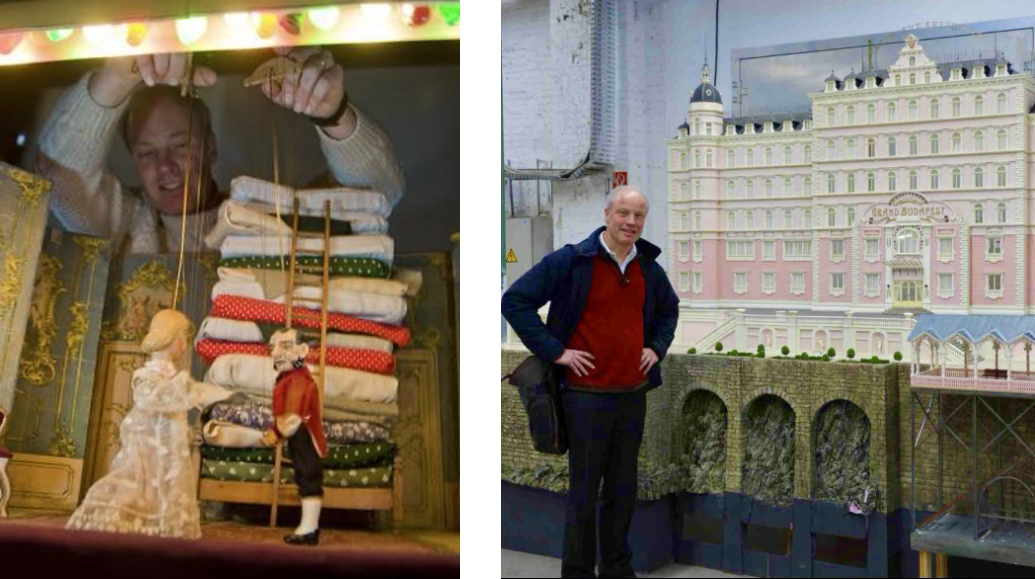
For its first installment of the 2022 Spring Puppet Forum Series, the Ballard Institute and Museum of Puppetry at the University of Connecticut will host “Puppetry and Production Design” with stage designer Carl Sprague on Thursday, Feb. 24 at 7 p.m. ET. This forum will take place on Zoom (registration required: us06web.zoom.us/webinar/register/WN_zrMzhIPuTeOEaY9FtCrsvw) and Facebook Live (facebook.com/BallardInstitute/) and will be available afterwards on Facebook and the Ballard Institute YouTube Channel (youtube.com/channel/UC3VSthEDnYS6ZjOwzT1DnTg).
In a conversation with Ballard Institute Director John Bell, puppeteer and production designer Carl Sprague will discuss the nature of images, objects, and puppet performance, in such films as The French Dispatch, Twelve Years a Slave, Amistad, and La La Land, as well as his own work as a puppeteer of Czech marionettes. This forum is co-sponsored by UConn’s Krenicki Arts and Engineering Institute.
Carl Sprague got his start in performance and scene design at age eight – playing with the Czech family marionette theater originally created by his great-grandfather. He went on to work in theater and film, taking a degree in Film (and Philosophy!) at Harvard, which began him on a long career in production design. Notable theater companies he has designed for include Berkshire Theatre, Oldcastle Theatre Company, Mixed Company, Music-Theatre Group, Hubbard Hall Opera, Shakespeare & Company, Moscow Ballet, and the Albany Berkshire Ballet.
Carl’s professional film career has taken him from a long association with special effects wizard Douglas Trumbull to big and small Hollywood features, including Martin Scorsese’s Age of Innocence, The Social Network, Twelve Years a Slave, and Tesla. He is fortunate to have worked with Wes Anderson on six films, beginning with The Royal Tenenbaums, and including Grand Budapest Hotel and The French Dispatch. He has designed three features with Maya Forbes and Wally Wolodarsky. Documentary master Errol Morris has also called on him, and Woody Allen tapped him to design his series for Amazon. Carl’s sets for photographer Gregory Crewdson have been featured in the New York Times.
Carl continues to play with puppets.
For more information and to learn about other Ballard Institute online programming, visit bimp.uconn.edu or email bimp@uconn.edu.
The Ballard Institute is reopen!
The Ballard Institute and Museum of Puppetry at the University of Connecticut celebrates the return of UConn students to the university’s Main Campus in Storrs with the re-opening of its ground-breaking exhibition Hecho en Puerto Rico: Four Generations of Puerto Rican Puppetry, curated by Dr. Manuel Morán and Deborah Hunt. The museum is open Wednesday-Saturday 10 a.m. to 4 p.m. The exhibition is co-sponsored by the UConn Puerto Rican and Latin American Cultural Center (PRLACC) and El Instituto: Institute of Latina/o, Caribbean, and Latin American Studies.
Ballard Institute director Dr. John Bell said “we are very excited to once more share the amazing richness, color, and variety of Puerto Rican culture in this first-ever exhibition of historical and contemporary puppetry from the island.” Hecho en Puerto Rico invites the spectator to discover over fifty years of puppet productivity, by four distinct generations of builders and performers in and from Puerto Rico, from the 1960s to current times. Despite economic and political turmoil as well as natural disasters, the young and thriving Puerto Rican puppet movement continues to evolve and grow.
Hecho en Puerto Rico highlights the work of such puppeteers and companies as Agua, Sol y Sereno; Brenda Plumey; Daniel y sus Muñecos; Deborah Hunt; Edward Cardenales; El Mundo de los Muñecos; José López; Luis Villafañe; Mario Donate; Mary Anne Hopgood; Papel Machete; Poncili Creación; Pura Belpré; Santin y sus Muñecos; Teatro SEA and Manuel Morán; Tere Marichal; Vueltabajo Teatro; and Y No Había Luz.
Co-curator Deborah Hunt has lived and worked as a mask maker, mask and object theatre performance artist since 1973, creating and presenting original theatre works, performances and festivals or encounters in the South Pacific, the Caribbean, Europe, and Asia. Born and raised in Aotearoa New Zealand, she has been based in Borikén/Puerto Rico since 1990, where she founded Maskhunt Motions, a nomadic laboratory for experimental object theatre work. Hunt teaches mask work and puppetry in communities worldwide, in a practice exploring puppetry in public and private spaces. Her work ranges in scale from the miniature to creating giant puppets that transform into peepshows. She has created encounters and festivals to promote puppetry for adult audiences and published mask and puppetry manuals in Spanish and English. She is interested in performing in unconventional places and to very intimate audiences. Hunt characterizes her work as “theatre of the useless.”
Co-curator Dr. Manuel Morán (www.manuelmoran.com) was born in San Juan, Puerto Rico, and studied at the University of Puerto Rico and New York University, where he earned a doctorate degree in Educational Theater. He is the Founder, CEO and Artistic Director of Society of the Educational Arts, Inc. (www.teatrosea.org). A writer, director, and producer for theater, television, and film, he is also an actor, singer and composer, and created the International Puppet Fringe Festival of NYC in 2018. He is a former Vice-President (2012-2021) of UNIMA (Union Internationale de la Marionnette). His three-part documentary film Títeres en el Caribe Hispano/Puppetry in the Caribbean premiered at the Havana Film Festival in Cuba in 2016 and has been screened in festivals around the world. Dr. Morán’s theater and literary work has been published in Cuba, Puerto Rico, and the United States, including his books Migrant Theater for Children: A Caribbean in New York (2016), and Mantequilla/Butter; Adventures and Tribulations of a Puerto Rican Boy (2017). He is currently starring in the web series El Avión The Airplane (www.elaviontheairplane.com), and is the proud dad of Manuel Gabriel, with whom he lives in New York City and San Juan, Puerto Rico.
Due to restrictions and safety precautions related to COVID-19, the museum will be open Wednesday through Saturday only, from 10 a.m. to 4 p.m., by reservation. One group of up to six visitors from a family or quarantine unit will be allowed in the museum at a time during each time slot. Face masks are required at all times when visiting the museum for ages two and up. Hand sanitizer is available throughout the museum and staff clean high-touch surfaces once per hour. To learn more about the Ballard Institute’s COVID-19 protocols and to reserve a time slot, visit: bimp.uconn.edu/visit/reservations/. Visitors may also reserve a time slot by calling 860.486.8580.
